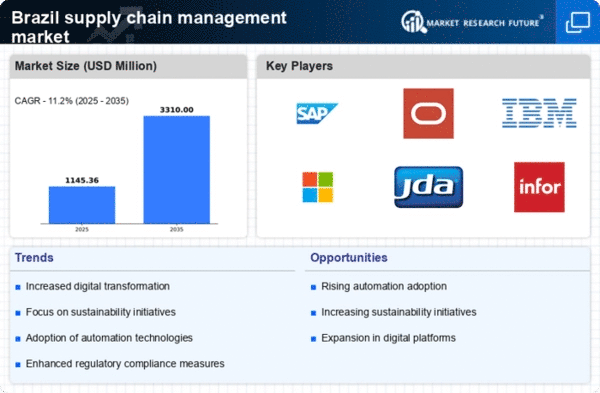Focus on Cost Reduction Strategies
In the current economic climate, Brazilian companies are increasingly prioritizing cost reduction strategies within the supply chain-management market. Organizations are exploring various methods to streamline operations, such as consolidating suppliers and optimizing transportation routes. By implementing these strategies, businesses can potentially reduce operational costs by 10-15%. This focus on efficiency not only improves profit margins but also enhances overall supply chain resilience. As companies navigate economic uncertainties, the emphasis on cost-effective supply chain solutions is likely to shape market dynamics, driving innovation and collaboration among stakeholders.
E-commerce Growth and Consumer Demand
The rise of e-commerce in Brazil is significantly impacting the supply chain-management market. With online retail sales projected to reach approximately $30 billion by 2025, companies are compelled to enhance their logistics capabilities. This surge in consumer demand necessitates efficient supply chain strategies to ensure timely delivery and customer satisfaction. As a result, businesses are investing in advanced warehousing solutions and last-mile delivery systems. The increasing expectation for rapid fulfillment is driving innovation in the supply chain-management market, as firms strive to meet the evolving needs of consumers. This dynamic environment presents both challenges and opportunities for stakeholders in the market.
Technological Advancements in Logistics
The supply chain-management market in Brazil is experiencing a notable shift due to rapid technological advancements. Innovations such as artificial intelligence (AI), machine learning, and the Internet of Things (IoT) are enhancing operational efficiency. For instance, AI-driven analytics can optimize inventory management, reducing costs by up to 20%. Furthermore, IoT devices facilitate real-time tracking of goods, which is crucial for maintaining supply chain integrity. As Brazilian companies increasingly adopt these technologies, the market is likely to see a surge in demand for integrated supply chain solutions. This trend indicates a growing recognition of the importance of technology in achieving competitive advantage within the supply chain-management market.
Investment in Infrastructure Development
Brazil's ongoing investment in infrastructure development is a critical driver for the supply chain-management market. The government has allocated substantial funds to improve transportation networks, including roads, ports, and railways. Enhanced infrastructure is expected to reduce logistics costs by approximately 15%, thereby facilitating smoother supply chain operations. Improved connectivity allows for faster movement of goods, which is essential for businesses aiming to optimize their supply chains. As infrastructure projects progress, the supply chain-management market is likely to benefit from increased efficiency and reduced transit times, ultimately enhancing competitiveness in both domestic and international markets.
Rising Demand for Transparency and Traceability
The supply chain-management market in Brazil is witnessing a growing demand for transparency and traceability. Consumers and regulatory bodies are increasingly advocating for visibility into supply chain processes, particularly concerning ethical sourcing and sustainability. Companies are responding by adopting technologies that enhance traceability, such as blockchain, which can provide immutable records of product journeys. This shift is not only a response to consumer preferences but also a proactive measure to comply with emerging regulations. As transparency becomes a competitive differentiator, businesses in the supply chain-management market are likely to invest in solutions that foster trust and accountability.
















